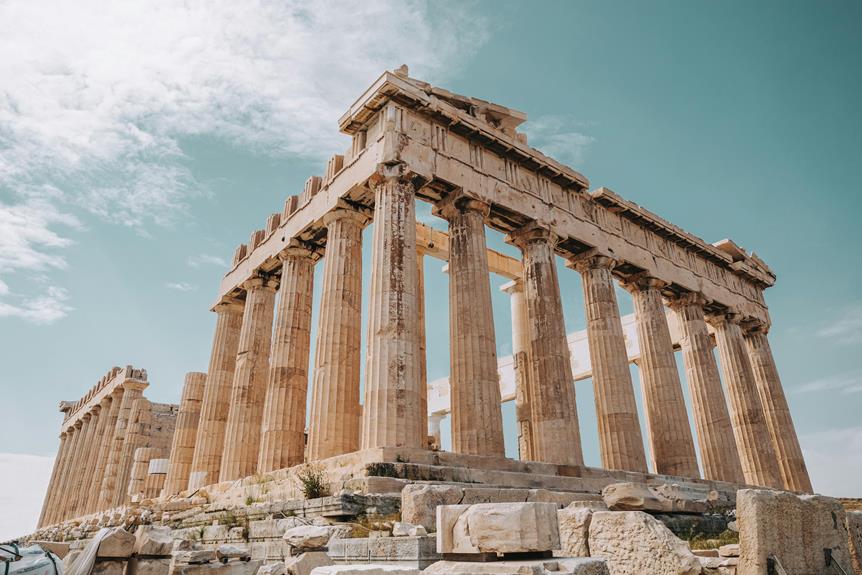Nestled on the Gallipoli Peninsula in Turkey, lies a place steeped in historical significance and natural beauty. The echoes of a pivotal World War I campaign linger in the rugged cliffs and pristine beaches that adorn this region. Beyond its historical past, Gallipoli offers a unique blend of cultural heritage and outdoor adventures, inviting visitors to uncover more than just a tale of wartime heroism. As the sun sets over the Dardanelles, a different chapter of exploration and discovery awaits those who seek a deeper connection with this enchanting destination.
Key Takeaways
- Gallipoli played a pivotal role in World War I military strategy.
- The peninsula boasts natural beauty with rugged cliffs and pristine beaches.
- It houses significant World War I memorials like the Ataturk and Lone Pine Memorials.
- Gallipoli's cultural heritage includes diverse culinary influences and traditional music.
- Visitors can enjoy adventure sports, Turkish cuisine, local markets, and historical sites.
Historical Significance of Gallipoli
What makes Gallipoli in Turkey historically significant?
Gallipoli holds immense historical significance due to its pivotal role in military strategy and its impact on international relations. During World War I, the Gallipoli Campaign took place from April 1915 to January 1916, where Allied forces, primarily composed of British, French, Australian, and New Zealand troops, attempted to secure the Dardanelles strait to establish a sea route to Russia and ultimately knock the Ottoman Empire out of the war. The campaign, however, faced significant challenges due to the Ottoman forces' strong defense and difficult terrain, resulting in heavy casualties on both sides.
The military strategy employed by both the Allies and the Ottoman Empire at Gallipoli showcased innovative tactics and fierce fighting, leaving a lasting mark on military history. Despite the ultimate failure of the campaign for the Allies, the lessons learned from Gallipoli influenced future military operations and strategies.
Furthermore, Gallipoli's historical significance extends to its impact on international relations. The campaign not only shaped the course of World War I but also had far-reaching consequences for the countries involved. Gallipoli fostered a sense of national identity for Australia and New Zealand, known as Anzac Day, and contributed to the decline of the Ottoman Empire, ultimately leading to the modern borders of Turkey. The events at Gallipoli continue to be remembered and commemorated by nations worldwide, highlighting its enduring importance in global history.
Natural Beauty of the Peninsula
The Gallipoli Peninsula in Turkey captivates visitors with its breathtaking natural beauty, characterized by rugged cliffs, pristine beaches, and rich biodiversity. Coastal landscapes along the peninsula offer a stunning juxtaposition of rocky formations meeting the clear waters of the Aegean Sea. The rugged cliffs, towering majestically, provide a dramatic backdrop to the sparkling blue sea, creating a picturesque setting that mesmerizes all who behold it.
Pristine beaches dot the coastline, inviting travelers to relax on their soft sands and bask in the warmth of the sun. These idyllic spots offer a tranquil retreat, perfect for those seeking a peaceful escape in nature. Visitors can unwind, listening to the soothing sound of the waves crashing against the shore, or take a leisurely stroll along the water's edge.
Moreover, the Gallipoli Peninsula boasts a rich biodiversity, providing ample opportunities for wildlife encounters. Birdwatchers can delight in spotting various avian species soaring through the sky or nesting in the cliffs. The diverse flora and fauna of the region create a vibrant ecosystem that supports a wide array of life.
World War I Memorials and Monuments
Amidst the stunning natural beauty of the Gallipoli Peninsula in Turkey lies a somber yet significant array of World War I memorials and monuments that pay tribute to the historical events that unfolded on this land. These impactful memorials stand as solemn remembrances of the sacrifices made by soldiers from various nations during the Gallipoli Campaign of World War I.
One of the most prominent memorials is the Ataturk Memorial, dedicated to the words of Mustafa Kemal Ataturk, the founder of the Republic of Turkey and a key figure in the Gallipoli Campaign. His heartfelt words to the Allied soldiers who lost their lives on Turkish soil are inscribed on the memorial, emphasizing unity and peace.
The Lone Pine Memorial, maintained by the Commonwealth War Graves Commission, commemorates the Australian and New Zealand soldiers who fought bravely during the campaign. The site is a place of reflection and respect for those who gave their lives in the conflict.
Additionally, the Chunuk Bair New Zealand Memorial honors the New Zealand soldiers who fought in the Battle of Chunuk Bair. This memorial stands as a symbol of national pride and valor, reminding visitors of the bravery displayed by those who served.
These memorials and monuments serve as powerful reminders of the past and encourage visitors to reflect on the impact of war while promoting a message of peace and remembrance.
Cultural Heritage and Local Traditions
Preserving and celebrating the cultural heritage and local traditions of the Gallipoli Peninsula in Turkey serves as an essential link to the region's rich history and identity. The local cuisine of Gallipoli is a reflection of its diverse cultural influences over the centuries. Traditional dishes such as 'keşkek' (a type of wheat stew) and 'sarma' (stuffed grape leaves) provide a taste of the region's culinary roots. These dishes often incorporate fresh herbs, olive oil, and locally sourced ingredients, showcasing the flavors unique to Gallipoli.
In addition to its culinary heritage, Gallipoli is known for its vibrant traditional music scene. The sounds of instruments like the 'bağlama' (a stringed instrument) and the 'zurna' (a type of wind instrument) can be heard at local gatherings and festivals, adding a melodic backdrop to the cultural tapestry of the region. These musical traditions have been passed down through generations, preserving the essence of Gallipoli's past.
Activities and Attractions for Visitors
Exploring the Gallipoli Peninsula in Turkey offers visitors a diverse range of activities and attractions to immerse themselves in the rich history and natural beauty of the region.
- Adventure Sports: The rugged terrain of Gallipoli provides the perfect backdrop for adventure sports enthusiasts. Visitors can engage in activities such as hiking along the stunning coastline, exploring hidden coves, or even setting out on a thrilling off-road jeep safari to discover the area's hidden gems. For those seeking a more adrenaline-fueled experience, paragliding over the cliffs that overlook the Aegean Sea offers a unique perspective of the landscape below.
- Culinary Delights: Turkish cuisine is renowned for its diverse flavors and aromatic spices, and Gallipoli is no exception. Visitors can indulge in traditional dishes such as kebabs, mezes, and baklava at local restaurants and cafes. For a truly authentic experience, exploring the bustling markets to sample fresh olives, cheeses, and seafood is a must. Additionally, participating in a cooking class to learn how to prepare signature Turkish dishes can provide a hands-on cultural experience.
- Historical Sites: Gallipoli is steeped in history, particularly known for its significance during World War I. Visitors can explore the many memorials, cemeteries, and museums dedicated to commemorating the soldiers who fought and lost their lives here. The Gallipoli Battlefields offer a poignant reminder of the past, allowing visitors to pay their respects and gain a deeper understanding of the region's historical importance.
Frequently Asked Questions
What Are the Best Local Dishes to Try in Gallipoli?
When exploring a region's traditional cuisine, experiencing local delicacies is key to understanding its culinary heritage. Sampling authentic dishes provides insight into the cultural fabric and gastronomic nuances of a place.
In Gallipoli, Turkey, visitors can savor a variety of local delicacies that showcase the rich flavors and unique ingredients of the region. From savory kebabs to aromatic stews, the traditional cuisine of Gallipoli offers a diverse and flavorful culinary experience.
Is It Possible to Visit Any Ancient Ruins Near Gallipoli?
Exploring ruins and historical sites is a popular activity for travelers seeking to uncover hidden treasures and investigate the rich tapestry of a region's past. Whether wandering through ancient cities or admiring archaeological wonders, these experiences offer a unique glimpse into the cultural heritage of a destination.
Visitors can also immerse themselves in local cuisine, handicrafts, cultural festivals, and offbeat attractions, providing a well-rounded exploration of a region's offerings.
Are There Any Traditional Crafts or Souvenirs Unique to Gallipoli?
Traditional crafts found in the region often reflect the local culture, offering visitors a glimpse into the heritage of the area.
Souvenir shops in the vicinity showcase a variety of unique items exclusive to the region, allowing tourists to take home a piece of the local tradition with them.
These crafts, ranging from handcrafted ceramics to intricate textiles, serve as tangible reminders of the rich cultural tapestry woven throughout the area.
Can Visitors Participate in Any Local Festivals or Events?
Visitors seeking to immerse themselves in local culture can often participate in various festivals and events, providing engaging cultural experiences. These opportunities allow individuals to join in community celebrations and traditional activities, fostering a deeper connection to the destination's heritage.
The chance to partake in local festivals provides a unique way to interact with the community, learn about customs, and create memorable experiences during one's travels.
Are There Any Hidden Gems or Off-The-Beaten-Path Attractions to Explore?
When seeking hidden gems or off-the-beaten-path attractions, adventurous travelers often prioritize locations such as hidden caves and unexplored trails for a sense of discovery.
Secret beaches offer secluded relaxation, while local markets provide insight into the authentic culture and traditions of a destination.
These unique spots cater to those who crave freedom from typical tourist attractions, offering a chance to explore lesser-known areas and create memorable experiences off the mainstream path.
Conclusion
To sum up, Gallipoli, Turkey, stands as a remarkable destination that seamlessly intertwines historical significance with natural beauty.
The region's World War I memorials, cultural heritage, and diverse array of activities cater to a wide range of interests, making it a must-visit for travelers seeking a unique and enriching experience.
With its breathtaking landscapes and rich history, Gallipoli truly stands as a jewel in Turkey's crown, offering visitors an unparalleled journey through time and nature.


